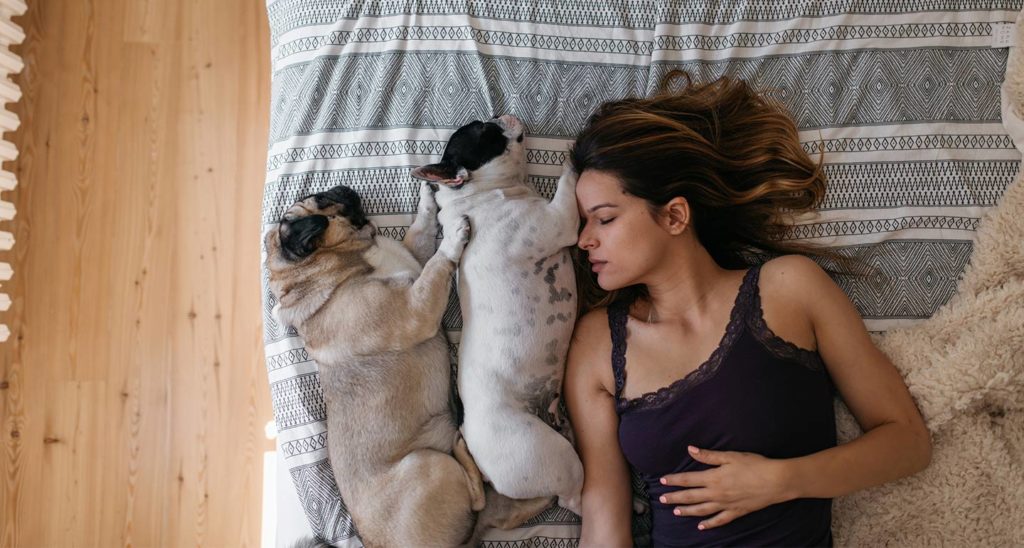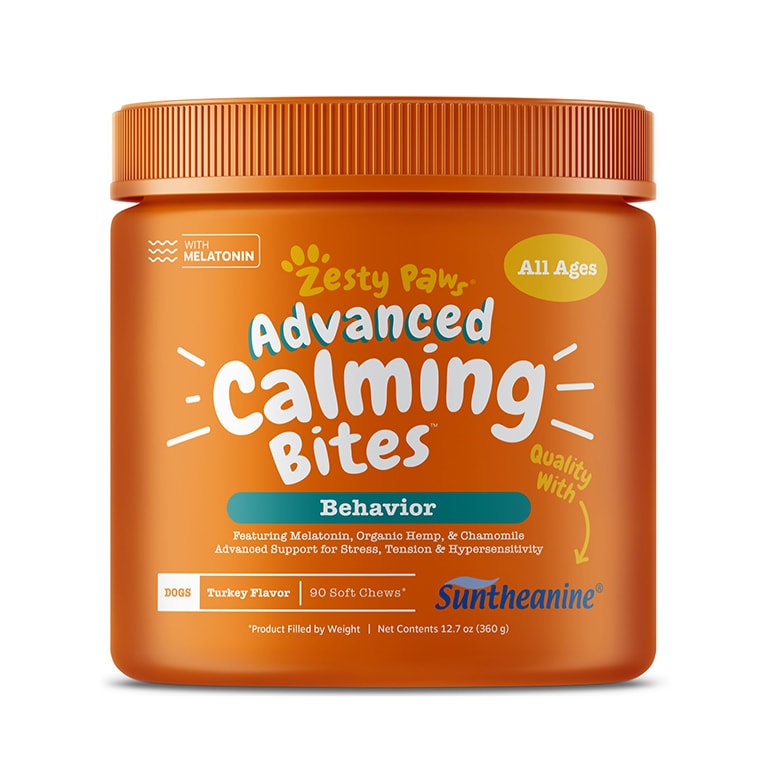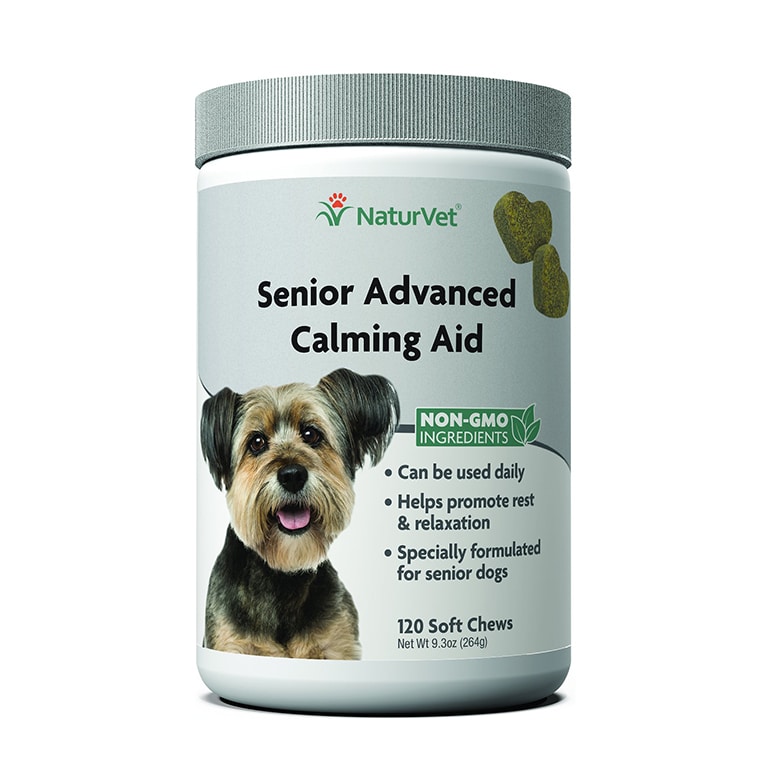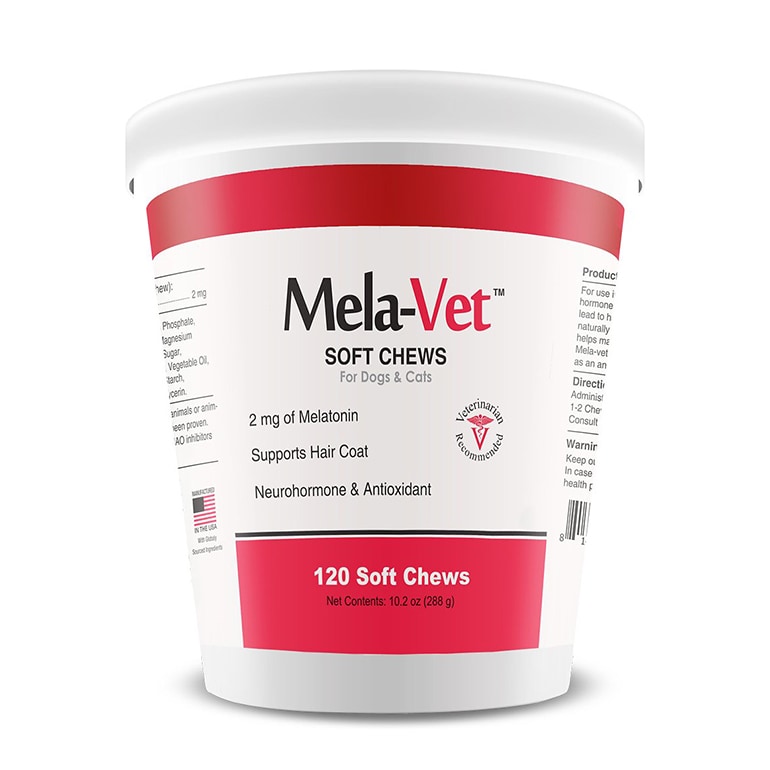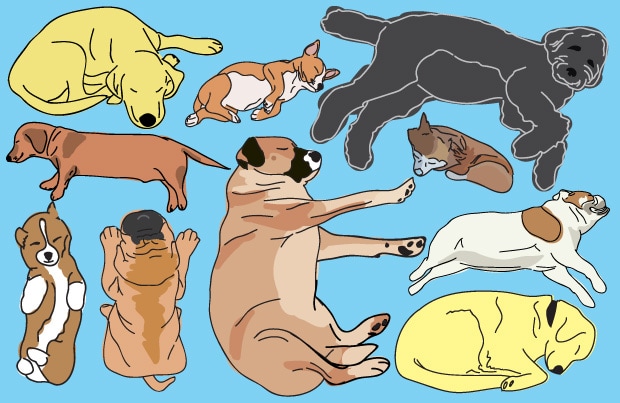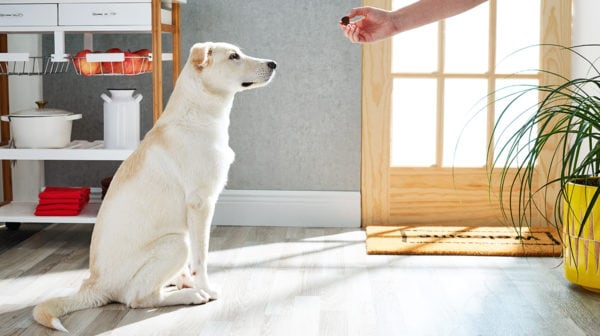First thing’s first: What is melatonin?
What about melatonin for dogs?
As Dr. Nelson reports, melatonin has a few different canine uses: It’s a known supplementary treatment for certain endocrine disorders in dogs, such as some atypical forms of Cushing’s disease, as well as seasonal alopecia. It could also be helpful in treating canine stress disorders.
“Melatonin can be used as an over-the-counter recommendation for dogs with aggression and anxiety,” says Dr. Nelson. “It has been shown to be useful as a part of separation anxiety protocols, for dogs with thunderstorm or fireworks phobias and for dogs with hospital or groomer-associated aggression and anxiety.
“Finally, melatonin is very useful for elderly dogs who do not sleep well at night,” she continues, explaining that with age-related cognitive dysfunction, the sleep-wake cycle can be interrupted. “Melatonin can be given to help these dogs (and their people) to once again get a good night’s rest.”
But is melatonin safe for dogs?
“While melatonin is considered very safe for dogs, it is always advised that you talk to your veterinarian prior to starting any new medications or supplements to ensure that it does not interact with any other medications your pet may be on,” Dr. Nelson urges.
“The side effects of melatonin are generally mild,” says Dr. Nelson, with the primary side effect being drowsiness, although the following may also occur:
- Upset stomach
- Itching
- Heart rate abnormalities
- Interruption of the reproductive cycle of female dogs
- Insulin resistance in diabetic animals
Dr. Nelson adds: “It is not recommended to give melatonin to dogs with liver or kidney disease, pregnant or nursing dogs, or puppies under the age of 12 weeks.”
And with the dosages being different and the potential additive of toxic artificial sweeteners, do not attempt to share your own (human) melatonin supplement with your pup. While you may share almost everything, it is best to only give them supplements intended for canine consumption and that have their entire ingredients list OK’d by your vet.
So, what’s the appropriate melatonin dosage for dogs?
Sounds great! What’s the best melatonin for dogs?
If your vet gives you the OK to try a melatonin supplement, Dr. Nelson says the best melatonin for dogs is dependent on the specific issue you wish to address.
For melatonin for dog anxiety, Dr. Nelson recommends Zesty Paws Stress & Anxiety Calming Bites with Suntheanine & Melatonin, which contains additional ingredients like the amino acid L-Theanine, organic hemp and chamomile. “For anxiety, a combination product that contains other calming herbs, amino acids and vitamins in addition to melatonin may enhance the calming effect,” she explains. With additional ingredients that include vitamin B and ginger, Dr. Lyon's Calming Aid with Melatonin is another option to consider.
Dr. Nelson also notes that if you’re using melatonin for dog anxiety that’s related to vet or grooming appointments, you should give your pup the supplement two hours ahead of the scheduled visit.
For senior dogs with sleep issues, Dr. Nelson recommends NaturVet Senior Advanced Calming Aid Soft Chews. This supplement is formulated to promote rest and relaxation with all-natural ingredients like melatonin, lemon balm and ginger. The soft chews are also gentle enough for senior dogs’ teeth.
“For dogs with hair cycle abnormalities or Cushing’s disease, a melatonin-only supplement is preferred,” says Dr. Nelson. For pets with hair loss or Cushing’s disease, she recommends Ora-Clens Mela-Vet Melatonin Soft Chew Dog & Cat Supplement. Each of these soft chews contain 2 mg of melatonin that can help regulate melatonin deficiencies that could contribute to hair loss.
OK, but how can melatonin help YOU?
According to Dr. Rachel Salas, M.D., an associate professor of neurology at John Hopkins Medicine, “Melatonin [supplements] can help with the timing of your sleep-wake schedule.” This means that, if you find yourself wide awake when you’re supposed to be snoozing, taking a melatonin supplement could potentially help you better regulate your sleep schedule and waking hours.
If your doctor deems melatonin an appropriate sleep supplement for you, Dr. Salas recommends a dosage of between 0.5 mg and 9 mg. “I typically use 1-3mg for most patients,” she says, and advises that this should be taken two hours before bedtime. You can talk to your doctor about the amount they specifically recommend for you.
Although melatonin is relatively safe, Dr. Salas says not to take more than the amount your doctor recommends. “Just like anything else, more is not always best or recommended,” she says. “It can provide a ‘hangover’ effect in some the next morning.” (And that’s the last thing you probably need!)
You’re definitely not alone if you find yourself struggling to sleep or concerned about your dog’s anxiety. There’s plenty to keep you up at night, after all! And similarly, recent change-ups in your dog’s schedule (perhaps you’re heading back to work after spending most of your time at home) could be causing increased anxiety. Speak to your own doctor and your pup’s veterinarian to find out if melatonin sleep supplements could help the both of you lessen your stress.
Read more:
Share:
